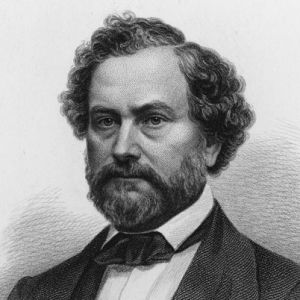Get Today in Masonic History into your Inbox. Sign up today for one of our email lists!
Need an article for your Trestleboard/Newsletter see our Use Policy
Samuel Colt Passes Away

Today in Masonic History Samuel Colt passes away in 1862.
Samuel Colt was an American inventor and industrialist.
Colt was born on July 19th, 1814. Prior to his birth, Colt's father moved the family to Hartford to establish a textile business. Colt's mother passed away from tuberculous when Colt was six years old.
At the age of 11 Colt was indentured to a farmer in Glastonbury. He did chores and attended school. While living on the farm Colt was introduced to the book Compendium of Knowledge. The Compendium was a science book with information about inventions, science, inventors and scientists. The book became a major influence in Colt's life. It was reading the Compendium and hearing about new innovations in firearms led the young Colt to decide to make the "impossible gun".
In 1829, Colt was sent off to boarding school. Prior to his departure he put a public display of his growing skill with pyrotechnics. On the 4th of July he announced he intended to, using a homemade galvanic cell and some explosives, blow up a raft on Ware Pond. The explosion missed it's target, and was still quite impressive.
Colt impressed his classmates at boarding school with pyrotechnics as well, until in 1830 when one of his displays caused a fire. Colt's father sent him off to learn the seaman's trade.
While on a voyage on the Corvo, Colt was still watching for science in every port they went to. He was also observing his surroundings. Colt noticed the way the ships wheel interacted with the clutching mechanism and how every time the spokes of the wheel and the clutch always lined up perfectly. Colt claimed later it was his inspiration for the revolver.
When Colt returned home in 1832, he asked his father to finance the production of two pistols and a rifle. Unfortunately the first produced pistol blew up and Colt's father refused to provide any more funding.
It was then Colt learned a new skill which serve him well the rest of his life. Colt learned the art of the sale. To raise money for the development of his pistol Colt put on lectures. Initially he did well, quickly though ticket sales slowed. Colt came up with the idea to put on a larger more spectacular show based on Dante's The Divine Comedy. His new show filled with art and of course pyrotechnics was a huge hit and cemented his reputation as a pitchman.
By 1835 Colt's prototype gun was ready to be patented. On the advise of a family friend he was advised to seek a patent in Britain first to avoid legal issues in Britain if his invention was patented in the United States first. In 1836 the Colt Patterson was patented. This early pistol was a practical application of Elisha Collier's revolving flintlock pistol, with which Colt never disagreed. Colt's adding of a locking bolt made the pistol more reliable.
In 1836 in Patterson, New Jersey the Patent Arms Manufacturing of Paterson, New Jersey was chartered by the New Jersey Legislature. Colt received commission for each gun sold and received full control of his patent if the Patent Arms were to close. This also led to another of Colt's innovations. Prior to this time the parts for pistols were made some by machine and others by hand. Colt envisioned all the parts of his pistols as being made by machine and interchangeable. This was the first assembly line.
By 1843 the Patent Arms Manufacturing of Paterson, New Jersey was closed due to poor sales and other difficulties. Colt continued on though. Colt developed underwater mines, determining a wire used underwater for detonation. Teaming with Samuel Morse, Colt's wire was used by Morse to lay telegraph cables under rivers, lakes and in one attempt under the ocean. Morse also used the power cell Colt developed because it was far stronger.
In 1847 Captain Samuel Walker, a Texas Ranger, sought out Colt in New York. Walker had first had experience with the Colt Patterson and felt the pistol was just what they needed in Texas during the Mexican-American War. Walker ordered 1,000 pistols and had requests for changes to the gun. It needed to have 6 shots and had to be able to kill a man or a horse in a single shot. Colt complied and with he help of a gunsmith produced the gun. With Colt's share of the profits he bought the machinery to make his assembly line and the Colt's Patent Fire-Arms Manufacturing Company was born and still exists today.
When the American Civil War approached Colt sold weapons to both sides. Pure and simply Colt was a capitalist and often sold to both sides in a conflict. Colt did not see slavery as a moral issue and given time the inefficiency of slavery was going to cause it to fade away. Colt was accused by many Northern newspapers as being a Southern sympathizer. To quiet those rumors Colt enlisted in the Connecticut militia. His service lasted less than year though and his unit never saw a battlefield.
Colt passed away on January 10th, 1862 in Hartford, Connecticut.
Colt was a member of St. Johns Lodge in Hartford, Connecticut.
This article provided by Brother Eric C. Steele.

